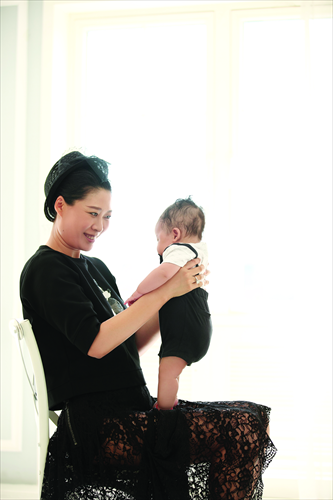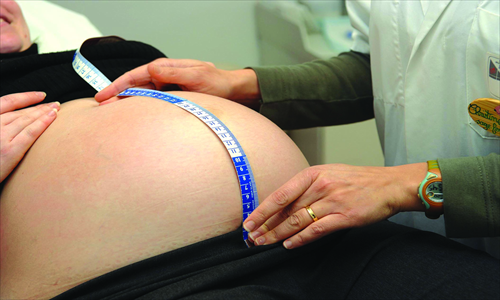Middle-aged maternity

Lily Gao (pictured with son Samuel Hu) believes putting her career ahead of motherhood was the right decision, even though she suffered complications during her pregnancy. Photo: Courtesy of Lily Gao
At 38, Lily Gao is a relative latecomer to motherhood. She was thrilled when she became pregnant last year after years of trying to conceive. Doctors had warned Gao that she and her baby faced increased health risks because of her age, which she experienced when was rushed to hospital after experiencing sharp pains in her third trimester.
Doctors found kicking by Gao's unborn son inside her womb had caused severe uterine bleeding, which led to his birth by Caesarean section. Gao's son, Samuel Hu, was born nearly a month premature in April this year.
Most medical studies pinpoint the optimum time for women to become pregnant at between 24 and 29, an age range when they are most fertile. Pregnant women over 35 are more likely to encounter complications, but that hasn't deterred many from pursuing their maternal aspirations.
"The whole process, from conception to postnatal recovery, turned out to be extremely difficult and exhausting. But I'll never regret becoming a mother later in life," Gao said.
The average age of first-time mothers has steadily risen globally. Statistics from the Organization for Economic Co-operation and Development showed that last year the UK and Germany topped the world with the oldest first-time mothers at an average age of 30. The Beijing Daily reported findings from a local survey put the average age of first-time mothers in the city at 29, up 1.5 years from 2000.
Middle-aged maternity is particularly booming in urban centers. Women over 35 account for about 7 percent of all pregnancies in first-tier Chinese cities, an increase of 5 percent from the 1990s, the Shanghai Evening Post reported in 2010.
But the trend of Chinese women delaying motherhood in favor of professional development has sparked heated debate in recent years. While giving birth before 30 presents lower health risks to mother and baby, some argue that older mothers who are more mature and financially independent can provide a better environment to raise a child.
Choosing the 'right' time
Gao has always loved children, but said she and her husband didn't consider having one of their own until she turned 35. As an ambitious businesswoman who runs a company marketing American jewelry brand Miss Pearl in China, her reason for postponing maternity was straightforward: she felt her career would suffer if she had to juggle it with raising a child.
Li Ting, 41, a mid-level manager at a State-owned asset management company in Beijing's Financial Street, believes women should have children after they land a stable job that can assure a decent livelihood. A migrant to Beijing from Chongqing in Southwest China, Li gave birth at 35 in 2007 to her son.
"I was assigned to work in Beijing in 2003. My career was still unstable in my early 30s. Life was stressful enough," she said. "I believed we should at least first buy an apartment to provide a home for our son and my parents, who take care of him."
Li's decision to put her career first paid off in the form of a promotion, but she decided not to delay motherhood any longer and became pregnant at 35.
Abandoning the DINK lifestyle
Ren Yingchun, president of the Better Care Confinement Center postnatal facility and a former head nurse at Beijing Friendship Hospital's gynecology and obstetrics department, noted lifestyle differences in rural and urban areas influence a woman's timing to start a family.
"Women in big cities, where the job market is more competitive and workplace pressures are higher, tend to hesitate about when to give birth and consider more aspects of life," said Ren. "Many women today have set high expectations for themselves. They wait until they believe they can provide the best conditions for raising children."
Other latecomers to motherhood are women who plan DINK (double income, no kids) lifestyles when they are younger only to change their minds. Wang Zhihui, deputy director at the Beijing Antai Maternity Hospital, said a significant proportion of her patients belong in this category.
"Many women realize the importance of children, especially in maintaining a good spousal relationship, as they become older," said Wang, who guides women of advanced maternal age on conception and pregnancy.
Born in the 1960s, Wang said her generation was among the earliest in China to be influenced by the idea of putting their careers first and parenthood second. Among her university classmates, she said, three couples had reneged on the DINK lifestyle.


Many doctors recommend women planning children to give birth before 30 for health reasons, but motherhood can conflict with personal and professional ambitions. Photos: IC, CFP
Risk of complications
The choice of becoming a mother later in life inevitably means facing greater challenges than younger, more fertile women.
Gao recalled how she felt disheartened upon learning that, as a 35-year-old, her chances of becoming pregnant were much slimmer than if she tried to conceive several years earlier.
"For two years, I felt frustrated at reading negative home pregnancy tests," she said. "I never thought I was 'old' until I experienced the difficulties of pregnancy."
After eventually becoming pregnant, Gao then dealt with concerns over her unborn son's health. The risks of birth defects among pregnant woman aged 25 to 34 are 0.5 percent, while the rate is 4 percent for women aged 35 to 44. The chance of having a baby with Down syndrome at 35 is one in 300, or triple that of mothers under 30, according to a 2013 study by American diagnostics company Ariosa. There are also higher rates of gestational diabetes, congenial heart disease and cleft lips or palates among babies born to older mothers.
"I worried about miscarrying in the third month. I was afraid of the high risks of birth defects my baby faced in the fifth month. I then began worrying about him being born premature. After he was born [prematurely], I immediately had him tested," said Gao, adding that the results revealed no abnormal signs.
In Beijing, mothers-to-be over 35 need to undergo tests proving they are in good physical health or else risk being refused by local hospitals. In one of her examinations while pregnant, Li's uterus was found to have problems that heightened the risk of a miscarriage.
She was subsequently advised to undergo an amniocentesis examination to test fluid in her womb. "It can be extremely painful. The operation itself could have potentially harmed the baby," she said. After consideration, Li decided not to take the test under the belief that her overall "physical condition was good."
Is older better?
Despite all the risks to mothers and their babies, women over 35 insist there are many positives of raising children later in life.
Mothers of advanced age are often more mentally prepared compared with mothers in their 20s still maturing, said Gao.
"I know some young mothers who have no idea about their children's early development and just leave them to be raised by their grandparents. The role of a mother is critical for children," said Gao.
Ren agrees that many middle-aged women are well-suited to motherhood. At the Better Care Confinement Center, more than 10 percent of mothers are over 35. "Some younger mothers are reluctant to breastfeed their babies because they want to keep their breasts' shape, whereas older mothers are willing to do anything for the good of their babies," she said.
Although advancement of fertility drugs has helped more older women become pregnant, both Wang and Ren insist the ideal time to become a mother is still before 30.
"The earlier you start preparing, the earlier any problems can be detected. The possibility of giving birth to a healthy baby is much higher," Ren said.
Gao said if she had her time again she would have given birth in her early 30s. "There is no 'best time,' only a time when you believe you are fully prepared," she said.